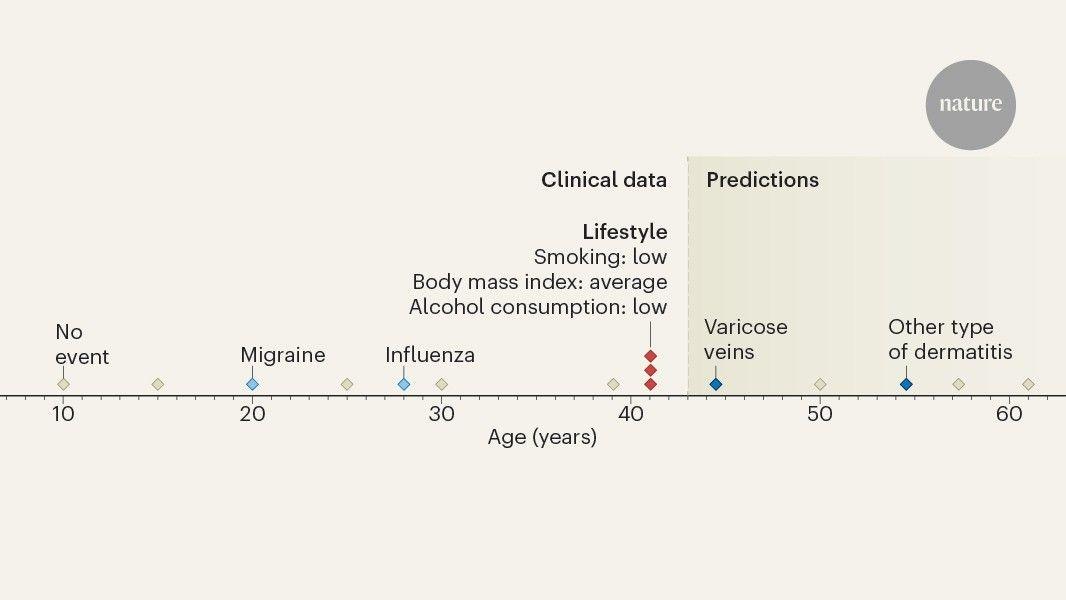AI Tools Show Promise in Advancing Aging Research and Personalized Interventions
2 Sources
2 Sources
[1]
AI tools show potential to improve aging interventions and recommendations
National University of Singapore, Yong Loo Lin School of MedicineJan 27 2025 A collaborative study between researchers from the Yong Loo Lin School of Medicine, National University of Singapore (NUS Medicine), and the Institute for Biostatistics and Informatics in Medicine and aging Research, Rostock University Medical Center, Germany, investigated how advanced AI tools, like Large Language Models (LLMs), can make it easier to evaluate interventions for aging and provide personalised recommendations. The findings were published in the leading review journal aging Research Reviews. Research into aging is producing an overwhelming amount of data, making it difficult to determine which interventions-such as new medicines, dietary changes, or exercise routines-are safe and effective. This study investigated how AI can analyze data more efficiently and accurately, by proposing a comprehensive set of standards for AI systems to ensure they deliver accurate, reliable, and understandable evaluations through their ability to analyze complex biological data. The researchers identified eight critical requirements for effective AI-based evaluations: Correctness of the evaluation results. Data quality will be assessed for accuracy. Usefulness and comprehensiveness. Interpretability and explainability of the evaluation results. Clarity and conciseness of the results and the given explanations. Specific consideration of causal mechanisms affected by the intervention. Consideration of data in a holistic context: Efficacy and toxicity, and evidence for the existence of a large therapeutic window; Analyses in an "interdisciplinary" setting. Enabling reproducibility, standardisation, and harmonization of the analyses (and of the reporting). Specific emphasis on diverse longitudinal large-scale data. Specific emphasis on results that relate to known mechanisms of aging. Telling LLMs about these requirements as part of the prompting improved the quality of the recommendations they produced. We tested AI methods using real-world examples such as medicines and dietary supplements. We found that by following specific guidelines, AI can provide more accurate and detailed insights. For instance, when analysing rapamycin, a drug often studied for its potential to promote healthy aging, the AI not only evaluated its efficacy but also provided context-specific explanations and caveats, such as possible side effects." Professor Brian Kennedy, Study Co-Leader, Department of Biochemistry & Physiology, and Healthy Longevity Translational Research Programme, NUS Medicine "The study's findings could have far-reaching effects," added Professor Georg Fuellen, Director, Institute for Biostatistics and Informatics in Medicine and aging Research, Rostock University Medical Center, who co-led the study, "For healthcare, telling the AI about the critical requirements of a good response can enable it to find more effective treatments and make them safer to use. Generally, AI tools could design better clinical trials and help tailor health recommendations to each person. This research is a major step toward using AI to improve health outcomes for everyone, especially as they age." Moving forward, the team is now focusing on a large-scale study of how to best prompt AI models for longevity-related intervention advice, to evaluate their accuracy and reliability for a wide array of carefully designed benchmarks, that is, curated, high-quality data. The validation of such AI systems is specifically important because the longevity interventions may then be implemented by a large number of healthy people. Prospective studies will need to demonstrate that AI-based evaluations can accurately predict successful outcomes in human trials, paving the way for safer and more effective health interventions. The team hopes to use their findings to make health and longevity interventions more precise and accessible, and ultimately improve the quality and duration of life. Collaboration between researchers, clinicians, and policymakers will be essential to establish robust regulatory frameworks, ensuring the safe and effective use of AI-driven evaluations. National University of Singapore, Yong Loo Lin School of Medicine Journal reference: Fuellen, G., et al. (2024). Validation Requirements for AI-based Intervention-Evaluation in Aging and Longevity Research and Practice. Ageing Research Reviews. doi.org/10.1016/j.arr.2024.102617.
[2]
Transforming longevity research: AI paves the way for personalized treatments in aging science
A collaborative study between researchers from the Yong Loo Lin School of Medicine, National University of Singapore (NUS Medicine), and the Institute for Biostatistics and Informatics in Medicine and Ageing Research, Rostock University Medical Center, Germany, investigated how advanced AI tools, like Large Language Models (LLMs), can make it easier to evaluate interventions for ageing and provide personalised recommendations. The findings were published in the leading review journal Ageing Research Reviews. Research into ageing is producing an overwhelming amount of data, making it difficult to determine which interventions -- such as new medicines, dietary changes, or exercise routines -- are safe and effective. This study investigated how AI can analyse data more efficiently and accurately, by proposing a comprehensive set of standards for AI systems to ensure they deliver accurate, reliable, and understandable evaluations through their ability to analyse complex biological data. The researchers identified eight critical requirements for effective AI-based evaluations: Telling LLMs about these requirements as part of the prompting improved the quality of the recommendations they produced. Professor Brian Kennedy from the Department of Biochemistry & Physiology, and Healthy Longevity Translational Research Programme at NUS Medicine, who co-led the study, said, "We tested AI methods using real-world examples such as medicines and dietary supplements. We found that by following specific guidelines, AI can provide more accurate and detailed insights. For instance, when analysing rapamycin, a drug often studied for its potential to promote healthy ageing, the AI not only evaluated its efficacy but also provided context-specific explanations and caveats, such as possible side effects." "The study's findings could have far-reaching effects," added Professor Georg Fuellen, Director, Institute for Biostatistics and Informatics in Medicine and Ageing Research, Rostock University Medical Center, who co-led the study, "For healthcare, telling the AI about the critical requirements of a good response can enable it to find more effective treatments and make them safer to use. Generally, AI tools could design better clinical trials and help tailor health recommendations to each person. This research is a major step toward using AI to improve health outcomes for everyone, especially as they age." Moving forward, the team is now focusing on a large-scale study of how to best prompt AI models for longevity-related intervention advice, to evaluate their accuracy and reliability for a wide array of carefully designed benchmarks, that is, curated, high-quality data. The validation of such AI systems is specifically important because the longevity interventions may then be implemented by a large number of healthy people. Prospective studies will need to demonstrate that AI-based evaluations can accurately predict successful outcomes in human trials, paving the way for safer and more effective health interventions. The team hopes to use their findings to make health and longevity interventions more precise and accessible, and ultimately improve the quality and duration of life. Collaboration between researchers, clinicians, and policymakers will be essential to establish robust regulatory frameworks, ensuring the safe and effective use of AI-driven evaluations.
Share
Share
Copy Link
Researchers from NUS Medicine and Rostock University Medical Center explore how AI, particularly Large Language Models, can enhance the evaluation of aging interventions and provide personalized recommendations, potentially revolutionizing longevity research.

AI Tools Enhance Aging Research and Personalized Interventions
Researchers from the National University of Singapore (NUS) and Rostock University Medical Center have conducted a groundbreaking study exploring the potential of advanced AI tools, particularly Large Language Models (LLMs), in revolutionizing aging research and personalized health interventions. The study, published in Aging Research Reviews, proposes a comprehensive framework for leveraging AI to evaluate aging interventions more efficiently and accurately
1
2
.Addressing the Data Deluge in Aging Research
As aging research continues to generate vast amounts of data, scientists face increasing challenges in determining the safety and efficacy of various interventions, including new medicines, dietary changes, and exercise routines. The collaborative study investigates how AI can streamline data analysis and improve the accuracy of evaluations by establishing a set of critical standards for AI systems
1
.Eight Critical Requirements for AI-Based Evaluations
The researchers identified eight key requirements for effective AI-based evaluations in aging research:
- Correctness of evaluation results
- Usefulness and comprehensiveness
- Interpretability and explainability
- Clarity and conciseness of results and explanations
- Consideration of causal mechanisms affected by interventions
- Holistic context analysis (efficacy, toxicity, therapeutic window)
- Reproducibility, standardization, and harmonization of analyses
- Emphasis on diverse longitudinal large-scale data and known aging mechanisms
By incorporating these requirements into AI prompts, the researchers observed significant improvements in the quality of recommendations produced by LLMs
1
2
.Real-World Applications and Implications
Professor Brian Kennedy, co-leader of the study from NUS Medicine, highlighted the practical applications of their findings: "We tested AI methods using real-world examples such as medicines and dietary supplements. By following specific guidelines, AI can provide more accurate and detailed insights"
1
. For instance, when analyzing rapamycin, a drug studied for its potential in promoting healthy aging, the AI not only evaluated its efficacy but also provided context-specific explanations and caveats, including possible side effects2
.Related Stories
Future Directions and Potential Impact
Professor Georg Fuellen, Director at Rostock University Medical Center and co-leader of the study, emphasized the far-reaching effects of their research: "For healthcare, telling the AI about the critical requirements of a good response can enable it to find more effective treatments and make them safer to use. Generally, AI tools could design better clinical trials and help tailor health recommendations to each person"
1
2
.The research team is now focusing on a large-scale study to optimize AI model prompting for longevity-related intervention advice. This next phase aims to evaluate the accuracy and reliability of AI systems across a wide array of carefully designed benchmarks using curated, high-quality data
1
.Validation and Regulatory Considerations
As the potential for AI-driven evaluations in longevity interventions grows, the researchers stress the importance of validation through prospective studies. These studies will need to demonstrate that AI-based evaluations can accurately predict successful outcomes in human trials, paving the way for safer and more effective health interventions
1
2
.The team's ultimate goal is to leverage their findings to make health and longevity interventions more precise and accessible, potentially improving both the quality and duration of life. To ensure the safe and effective use of AI-driven evaluations, collaboration between researchers, clinicians, and policymakers will be crucial in establishing robust regulatory frameworks
1
2
.References
Summarized by
Navi
Related Stories
Recent Highlights
1
ByteDance's Seedance 2.0 AI video generator triggers copyright infringement battle with Hollywood
Policy and Regulation

2
Demis Hassabis predicts AGI in 5-8 years, sees new golden era transforming medicine and science
Technology

3
Nvidia and Meta forge massive chip deal as computing power demands reshape AI infrastructure
Technology








